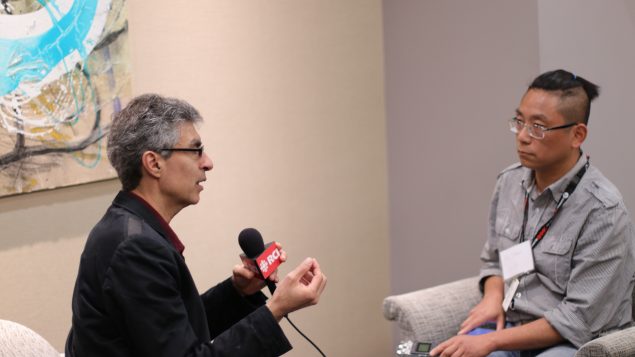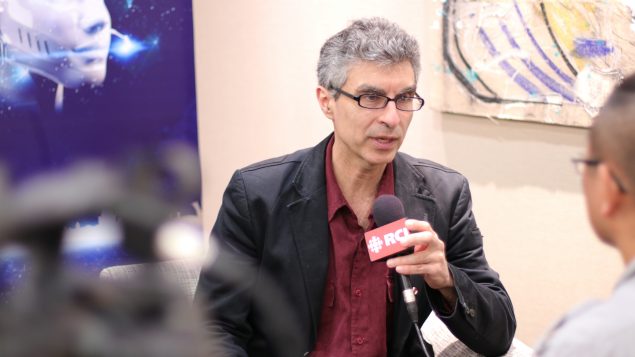

ΕΠΙΧΟΡΗΓΟΎΜΕΝΟ
Hmmm there seems to be a problem fetching this series right now.
Last successful fetch was on June 18, 2023 10:46 (
What now? This series will be checked again in the next day. If you believe it should be working, please verify the publisher's feed link below is valid and includes actual episode links. You can contact support to request the feed be immediately fetched.
在全球人工智能的热潮中,加拿大在AI领域突出的地位再次显示在世界面前,AI界三位开创性人物都在加拿大长期生活和任教。蒙特利尔更是加拿大最重要的人工智能中心。
世界级的AI宗师,Yoshua Bengio这一次来到中加创新创业论坛发表了主题演讲。他关注的目光已经从AI技术本身转化到AI的社会深层影响。他在论坛上呼吁人们,特别是各个政府对AI要有一个更开放、透明的态度,也要对AI的负面影响有充分准备。
在主题演讲后,沈二和Yoshua Bengio坐下来,面对面进行了一次简短但深入的采访。
https://www.youtube.com/watch?v=kRExEKHi-Ro&feature=youtu.be
沈二:我来自加拿大国际广播 – Radio Canda International,也就是CBC的国际部。我们做中文频道,所以我也来参加这个会议。
现在人工智能最大的投资来自中国或美国。加拿大,或许我不能说夹在两大势力中间,但必须与这两个国家打交道。
我的第一个问题是,您认为加拿大在这场人工智能超级大国的竞争中可以采取的立场是什么?
Yoshua Bengio:嗯。我不认为人工智能是一场力量竞争。我认为人工智能只是地球上正在发生的事情。我们必须互相帮助,用人工智能为人类创造一些有益的东西。
我认为不需要一个大国才能在人工智能领域产生巨大影响。例如硅谷,它实际上是一个小地方,但它对世界产生了巨大的影响。
现在以加拿大为例,我们是一个小国,但我们可以与其他国家合作,例如中国。
你知道科学领域一直是像社区一样。科学家们以开放的方式互相借鉴彼此的工作。人工智能现在正在以开放的方式取得进展。
我们所做的一切都是公开的,我们知道彼此的工作,所以它不是像国家之间的军事竞赛。
(人工智能创新)是在思维层面发生的事情,这里分享了很多人开发的代码,甚至在产业界也是如此。它是开源的。所以我不认为这是一场竞赛,这反而是一场国际合作。

人工智能三位奠基者大师之一Yoshua Bengio接受加广沈二采访。(赵杨平拍摄)
沈二:看起来,我们需要投入大量资金到人工智能中,然后才能产生出好的人工智能项目。
对于一些较小的创业公司,你认为他们还有机会参与其中吗?他们将如何开始?
Yoshua Bengio:你说得对,人工智能需要投资,有时需要大量的资金,但好消息是人工智能的核心是新算法。
算法可能只是少数人的工作,当然当你想要将这些新算法转换成你需要的产品时,例如,为了获得适量的数据或者向全世界销售人工智能产品,你会需要资本介入。
但是风险投资家对投资于这些人工智能公司有着巨大的兴趣和意愿,这就是为什么会有目前这样的增长。所以,如果你有好的想法和对产品的好主意,那么你可以开始是一个小创业公司,然后你会找到资本并快速增长。

人工智能三位大师之一Yoshua Bengio接受加广沈二采访。(赵杨平拍摄)
沈二:最后一个问题。很明显,人工智能会带来巨大的失业浪潮。
你担心吗?我们可以做些什么来帮助避免发生这样的事情?
Yoshua Bengio:是的,我担心自动化造成的就业市场断崖,尤其是AI的自动化。事实上,这也是我决定除了担任研究员和科学家的角色之外,参与帮助发展加拿大高科技生态系统的原因之一。
我认为这很重要,因为我们希望确保人工智能产生的财富可以重新分配,以帮助就业市场的转变,确保失去工作的人得到帮助并且不会掉入市场的裂缝中。
所以这里政府角色非常重要。总的来说,我们需要更好地重新思考即将到来的变革,思考我们的社会安全网和教育体系。
沈二:非常感谢您接受采访。
Er Shen: I’m from the Radio Canada International, the CBC’s International part. We are the Chinese channel, so I’m coming to this conference.
Now the most investment in AI is either from China or in the United States. Canada is a kind of country, I can’t say, stuck in between, but we have to deal with the two countries.
My first question is, what do you think the position Canada can take in this AI superpower struggle?
Yoshua Bengio: Well. I don’t see this as a power struggle. I think that it’s something that is happening on the planet and we have to help each other to build something good for Humanity with AI.
And I don’t think that you need to be a huge country to have a big impact. If you think about Silicon Valley, it’s actually a small place and it’s having a huge impact in the world.
Now in the case of Canada, it’s true it’s a small country but we can we can collaborate with countries, for example like China.
You know science has always been something of a community thing. Scientists build on each other’s work in an open way. AI right now is making progress in an open way.
Everything we do is published and we know about each other’s work so it’s not something like a military battle between countries.
It’s really something that’s happening at the level of ideas and there is shared a lot of the code people developed, even in industry. It’s open source.
So I don’t see this as a battle but rather as an international collaboration.
Er Shen: It seems we need to invest a lot of money into the AI, then you can make good AI projects.
For some smaller startups, do you think they still have the chance to get involved? How shall they get to start?
Yoshua Bengio: You’re right there’s a need for investing and sometimes it takes a lot of capital but the good news is that the heart of what is going on in AI is new algorithms.
These can be the developed by just a few people, then of course when you want to convert these new algorithms into products you need capital, for example, in order to obtain the right amount of data or to just be able to sell the products around the world.
But there’s a huge interest and willingness from venture capitalists who invest in such companies and that’s why there’s such a growth so you can have a small start-up if you have good ideas and a good idea for a product and good science behind then you will find capital to grow and can grow quite fast.
Er Shen: The final question. I think it’s obvious the AI will bring the big unemployment waves.
Are you concerned? What we can do to help people avoid what is happening ( with the job market )?
Yoshua Bengio: Yes, I am concerned about the disruptions in the job market due to automation and especially the automation that will come from AI.
In fact, that’s one of the reasons why I decided in addition to my role as a researcher and scientist to get involved to help grow the high-tech ecosystem here in Canada.
I think this is important is because we want to make sure that the wealth that is going to be generated from AI can be redistributed to help the transition in the job market to make sure that people who lose their jobs are helped and don’t fall between the cracks.
So the role of governments here is quite important. In general, we need to do a better job of rethinking our social safety net and education system with respect to the changes that are coming.
Er Shen: Thank you very much for taking the interview.
采访音频-Interview Audio ( In English ):
https://www.rcinet.ca/zh/wp-content/uploads/sites/6/2018/06/yoshua-Full_000.mp316 επεισόδια
Hmmm there seems to be a problem fetching this series right now.
Last successful fetch was on June 18, 2023 10:46 (
What now? This series will be checked again in the next day. If you believe it should be working, please verify the publisher's feed link below is valid and includes actual episode links. You can contact support to request the feed be immediately fetched.
在全球人工智能的热潮中,加拿大在AI领域突出的地位再次显示在世界面前,AI界三位开创性人物都在加拿大长期生活和任教。蒙特利尔更是加拿大最重要的人工智能中心。
世界级的AI宗师,Yoshua Bengio这一次来到中加创新创业论坛发表了主题演讲。他关注的目光已经从AI技术本身转化到AI的社会深层影响。他在论坛上呼吁人们,特别是各个政府对AI要有一个更开放、透明的态度,也要对AI的负面影响有充分准备。
在主题演讲后,沈二和Yoshua Bengio坐下来,面对面进行了一次简短但深入的采访。
https://www.youtube.com/watch?v=kRExEKHi-Ro&feature=youtu.be
沈二:我来自加拿大国际广播 – Radio Canda International,也就是CBC的国际部。我们做中文频道,所以我也来参加这个会议。
现在人工智能最大的投资来自中国或美国。加拿大,或许我不能说夹在两大势力中间,但必须与这两个国家打交道。
我的第一个问题是,您认为加拿大在这场人工智能超级大国的竞争中可以采取的立场是什么?
Yoshua Bengio:嗯。我不认为人工智能是一场力量竞争。我认为人工智能只是地球上正在发生的事情。我们必须互相帮助,用人工智能为人类创造一些有益的东西。
我认为不需要一个大国才能在人工智能领域产生巨大影响。例如硅谷,它实际上是一个小地方,但它对世界产生了巨大的影响。
现在以加拿大为例,我们是一个小国,但我们可以与其他国家合作,例如中国。
你知道科学领域一直是像社区一样。科学家们以开放的方式互相借鉴彼此的工作。人工智能现在正在以开放的方式取得进展。
我们所做的一切都是公开的,我们知道彼此的工作,所以它不是像国家之间的军事竞赛。
(人工智能创新)是在思维层面发生的事情,这里分享了很多人开发的代码,甚至在产业界也是如此。它是开源的。所以我不认为这是一场竞赛,这反而是一场国际合作。

人工智能三位奠基者大师之一Yoshua Bengio接受加广沈二采访。(赵杨平拍摄)
沈二:看起来,我们需要投入大量资金到人工智能中,然后才能产生出好的人工智能项目。
对于一些较小的创业公司,你认为他们还有机会参与其中吗?他们将如何开始?
Yoshua Bengio:你说得对,人工智能需要投资,有时需要大量的资金,但好消息是人工智能的核心是新算法。
算法可能只是少数人的工作,当然当你想要将这些新算法转换成你需要的产品时,例如,为了获得适量的数据或者向全世界销售人工智能产品,你会需要资本介入。
但是风险投资家对投资于这些人工智能公司有着巨大的兴趣和意愿,这就是为什么会有目前这样的增长。所以,如果你有好的想法和对产品的好主意,那么你可以开始是一个小创业公司,然后你会找到资本并快速增长。

人工智能三位大师之一Yoshua Bengio接受加广沈二采访。(赵杨平拍摄)
沈二:最后一个问题。很明显,人工智能会带来巨大的失业浪潮。
你担心吗?我们可以做些什么来帮助避免发生这样的事情?
Yoshua Bengio:是的,我担心自动化造成的就业市场断崖,尤其是AI的自动化。事实上,这也是我决定除了担任研究员和科学家的角色之外,参与帮助发展加拿大高科技生态系统的原因之一。
我认为这很重要,因为我们希望确保人工智能产生的财富可以重新分配,以帮助就业市场的转变,确保失去工作的人得到帮助并且不会掉入市场的裂缝中。
所以这里政府角色非常重要。总的来说,我们需要更好地重新思考即将到来的变革,思考我们的社会安全网和教育体系。
沈二:非常感谢您接受采访。
Er Shen: I’m from the Radio Canada International, the CBC’s International part. We are the Chinese channel, so I’m coming to this conference.
Now the most investment in AI is either from China or in the United States. Canada is a kind of country, I can’t say, stuck in between, but we have to deal with the two countries.
My first question is, what do you think the position Canada can take in this AI superpower struggle?
Yoshua Bengio: Well. I don’t see this as a power struggle. I think that it’s something that is happening on the planet and we have to help each other to build something good for Humanity with AI.
And I don’t think that you need to be a huge country to have a big impact. If you think about Silicon Valley, it’s actually a small place and it’s having a huge impact in the world.
Now in the case of Canada, it’s true it’s a small country but we can we can collaborate with countries, for example like China.
You know science has always been something of a community thing. Scientists build on each other’s work in an open way. AI right now is making progress in an open way.
Everything we do is published and we know about each other’s work so it’s not something like a military battle between countries.
It’s really something that’s happening at the level of ideas and there is shared a lot of the code people developed, even in industry. It’s open source.
So I don’t see this as a battle but rather as an international collaboration.
Er Shen: It seems we need to invest a lot of money into the AI, then you can make good AI projects.
For some smaller startups, do you think they still have the chance to get involved? How shall they get to start?
Yoshua Bengio: You’re right there’s a need for investing and sometimes it takes a lot of capital but the good news is that the heart of what is going on in AI is new algorithms.
These can be the developed by just a few people, then of course when you want to convert these new algorithms into products you need capital, for example, in order to obtain the right amount of data or to just be able to sell the products around the world.
But there’s a huge interest and willingness from venture capitalists who invest in such companies and that’s why there’s such a growth so you can have a small start-up if you have good ideas and a good idea for a product and good science behind then you will find capital to grow and can grow quite fast.
Er Shen: The final question. I think it’s obvious the AI will bring the big unemployment waves.
Are you concerned? What we can do to help people avoid what is happening ( with the job market )?
Yoshua Bengio: Yes, I am concerned about the disruptions in the job market due to automation and especially the automation that will come from AI.
In fact, that’s one of the reasons why I decided in addition to my role as a researcher and scientist to get involved to help grow the high-tech ecosystem here in Canada.
I think this is important is because we want to make sure that the wealth that is going to be generated from AI can be redistributed to help the transition in the job market to make sure that people who lose their jobs are helped and don’t fall between the cracks.
So the role of governments here is quite important. In general, we need to do a better job of rethinking our social safety net and education system with respect to the changes that are coming.
Er Shen: Thank you very much for taking the interview.
采访音频-Interview Audio ( In English ):
https://www.rcinet.ca/zh/wp-content/uploads/sites/6/2018/06/yoshua-Full_000.mp316 επεισόδια
Το FM Player σαρώνει τον ιστό για podcasts υψηλής ποιότητας για να απολαύσετε αυτή τη στιγμή. Είναι η καλύτερη εφαρμογή podcast και λειτουργεί σε Android, iPhone και στον ιστό. Εγγραφή για συγχρονισμό συνδρομών σε όλες τις συσκευές.